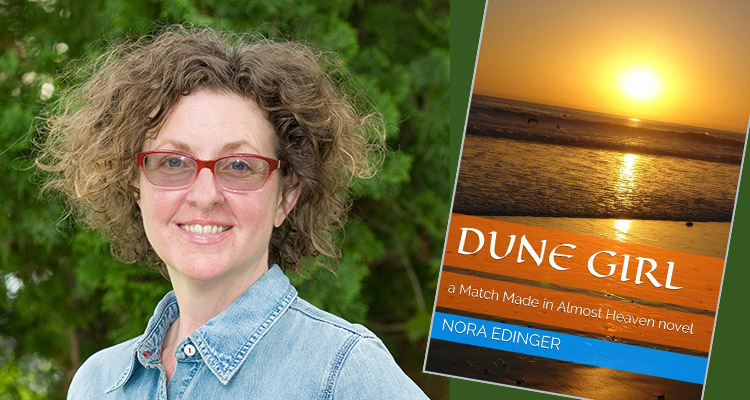While Wheeling residents may recognize Nora Edinger more easily as the mom of the Granola Girls, an area farmers-market staple, she is also a long-time journalist who worked for papers in the Chicago area and North Central West Virginia before moving to Wheeling 11 years ago.
In addition to freelance writing, which includes stories for Weelunk.com, she recently released her first work of fiction. She shared the backstory of this book in a recent interview with Weelunk.
Q: What is Dune Girl about and why did you write it?
A. Dune Girl is a modern, beachy re-imagining of the Old Testament romance of Ruth and Boaz. It involves a TV journalist whose whole world falls apart minutes before her wedding. There’s a mysterious voice providing life direction, a match-making older lady and a carpenter who has left behind a CEO position to create artisan furniture at the Indiana Dunes. They get thrown together, almost literally.
Why write it? I’ve written journalistically since I was 22, but I love fiction and had always wanted to do a book. The beachy side of the plot literally came to me in a dream in January 2015. I got up the next morning and started writing. It wasn’t until I was a few chapters in that I realized Dune Girl was, thematically, the same story as Ruth and Boaz. That made writing so much easier given that this was my first novel. I always knew where the core of the story was going.
Q. Ruth and Boaz are biblical characters. Is this a Christian romance?
A. The story skeleton – a woman in dire circumstances, a man who simply cannot stop helping her, an older widow who wants to fix things – is actually a Jewish romance. That said, there is Christian content in Dune Girl. It could sit comfortably in the Christian fiction section of the bookstore. But, it’s contemporary enough that it crosses over into mainstream fiction, as well. There are no Amish buggies or Victorian cowboys. It’s not Christian fantasy. It’s a fictionalized, clean-read look at real life.
Q. You mention bookstores, yet you released Dune Girl exclusively as an e-book through Amazon. Why is that?
A. I’ve learned a whole lot about the publishing industry in the last three years, mostly thanks to an unexpected friendship with an established writer. Entirely due to her help, I pretty much leap-frogged the agent stage and began dealing directly with publishers of mainstream fiction in late 2016. Getting published has never been easy given the money publishers have to risk on a new author. Books are serious business. But, late 2016 was not the best timing for a crossover (Christian/mainstream) book to hit the New York publishing world.
One publisher, bless their hearts, was interested in spite of the timing. They liked Dune Girl. At my friend’s advice, I wrote a second novel while I was waiting for them to decide whether they would take a chance. They read the second novel, asked for a revision, and I wrote that and a third manuscript. Sadly, they decided to “pass on this project” in February of this year. They were ultimately afraid I couldn’t compete with a well-established crossover writer named Robyn Carr.
It’s been a long haul. The last few months were so draining I realized the pursuit of traditional publishing was making me really unhappy. I needed to just get the book out. In preparation for an e-book launch, I started blogging this spring (JOY Journal at noraedinger.com), which I found out I loved all by itself. It’s been scary to take the leap and go solo on something as large as a book, but I’m happy I did it.
Q. Couldn’t you have tried the Christian fiction side of traditional publishing?
A. Absolutely. But, I’m not entirely comfortable with it. Publishing is a struggle no matter what your content is. It’s a mixed bag to single out Christians. It almost looks like, as a culture, we think Christian content needs a warning label like a pack of cigarettes. Or that we assume that Christians only want to read in an echo chamber. I’m not saying I would never go with a Christian publisher – there’s some really good writing out there — but I’ve always written in secular venues and I read broadly. My fiction should probably follow suit.
Q. What are you reading now?
A. The Bible, a stack of home-decorating magazines, news, other people’s blogs and a science thriller called The Curiosity by Stephen P. Kiernan. The last one kept me up way too late last night. It’s good.
Q. What makes a book good?
A. Boy, that’s a question and a half. As a reader, I want something that’s out of my experience but still gives me that “you think that way, too?” feeling. I love dialogue that reads like people actually speak. Also, I like books — both fiction and non-fiction — that have a definite flavor of place, what foodies call terroir.
Q. Dune Girl is a beach read set near Chicago. Does it have terroir?
A. You bet. The Indiana Dunes are the place of my childhood, the place where I fell in love with my husband, the place that shows up in any dream that involves “home.” That’s my beach and always will be.
There is a West Virginia element to it, as well. Two critical chapters take place in Canaan Valley, another place that I love. My other two manuscripts, which I hope to also release as e-books over the next year, are entirely set in West Virginia.
I don’t have a generational connection to the Mountain State, but it has been my home for 23 years, and I plan to stay here. I think that shows up in the stories, even in the series title. All three romances are grouped as A Match Made in Almost Heaven.
Q. Will there be more books in this series?
A. I hope so. It depends on sales. I’m not shooting for a best-seller lifestyle, but I don’t plan on writing books for free, either. If sales are encouraging, I have ideas for another couple of titles, including one set in Wheeling. If they’re not, I’ll just be happy that I’ve been blessed with the opportunity to do something I’ve always wanted to do. It’s been an adventure, either way.
Q. Tell us about your writing habits. Do you write every day, at a particular time of day?
A. I write every weekday. I usually start with my blog, often before breakfast, and then fit whatever else I’m working on that day around our general household schedule. In the summer, I prefer to only do blogging and freelance writing. Fiction is reserved for when everyone is at school or work and I don’t have to pop out of my chair because the bathroom fan is making a funny noise. Whatever the time of year — given that I work at home in a household of five people and a dog — I have to be organized but realistic. Not everything that I’d like to do actually happens. That’s why I’m still working on book promotion, and it’s summer. I had hoped to get this done before the school year ended. But, writing is like everything else in life — you just have to roll with it.
At night and on the weekend, I don’t even write my name if I can help it.
Q. Do you have any advice for writers, as far as getting books published?
A. I’m not really qualified to give advice, but I can offer an observation. Like any other profession, book writing is basically a wedding cake. There are a tiny handful of Stephen Kings at the top. There’s a small layer of highly skilled writers making a solid living, but not achieving name recognition under that. In the middle, you have people like me. The writing’s professional, but it’s likely self-published and, moneywise, it’s an unusual part-time job, not an entire career. There’s also a large layer of writers who may be self-published or may just be writing in a journal, on a laptop or hand drawing illustrations around their poems in an art book. These are pleasure writers — and there shouldn’t be any shame in that. Writing is writing. It can taste really good at any level.
However, if you aspire to be in those upper two layers, you just have to know that you need to not only write brilliantly, you have to be a CEO-level business person at the same time. A break will probably be needed in an early stage, as well. That top layer is achievable, but not by most writers.
Visit Nora Edinger’s author page on Amazon and check out “Dune Girl” here.



